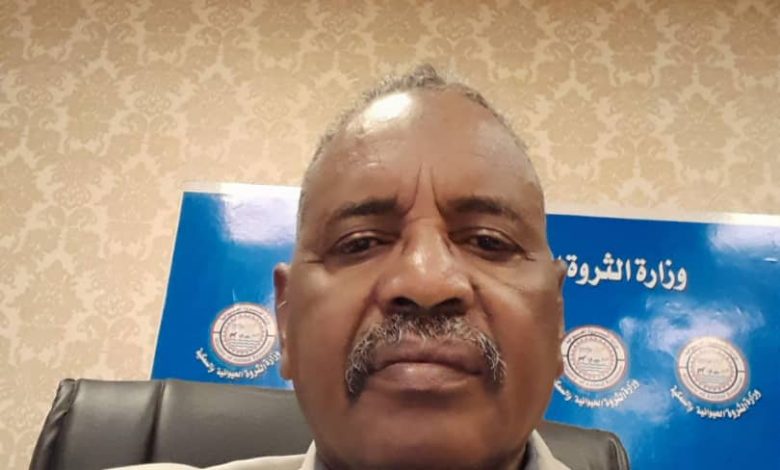Livestock Undersecretary, Dr. Hassan Al-Toum, in Frank statements

Interviewed by Nahid Oshi
– We lost the central laboratory for veterinary vaccines due to the war
– We need $20 billion to rebuild the sector
– We have 130 million heads, and this is our plan
– The volume of exports during the war was approximately five million heads
Sudan enjoys huge wealth and natural resources that place it among the economically developed countries and a pioneer, especially in the field of food security, by possessing animal resources exceeding 130 million heads of livestock. However, the ongoing crises, in addition to the war that broke out on the fifteenth of April last year, cast a negative shadow on all sectors. The livestock sector is not far from the obvious impact, as due to the war, Sudan lost the largest vaccine production factory in Africa, the Central Veterinary Vaccines Laboratory, in addition to 50% of veterinary quarantines being out of work, and the poultry sector was affected, especially in Khartoum and Gezira. The events put the issue of the sector, its impact by the war, and the issue of its reconstruction before the Undersecretary of the Ministry of Livestock, Dr. Hassan Al-Toum, who responded during the following interview:
All sectors were affected by the war that broke out in Sudan. To what extent was the livestock sector affected?
-The livestock sector is a vital sector and has a huge economic return represented by the number of workers in the sector, including exporters, traders, workers, technicians, veterinarians, transport workers, export trucks, farm workers, slaughterhouse workers, etc.
A sector of such magnitude has certainly been greatly affected by the war taking place in the country. The ministry’s plans, which aimed to develop the sector to the highest levels, have collapsed.
Despite the horrific deterioration that occurred as a result of the war, the quarantines workers were determined to continue exports despite the suffering, and therefore we achieved unprecedented numbers.
How can the sector be rebuilt after the end of the war?
– Reconstructing the sector requires a great effort from the state and the assistance of international organizations that support the reconstruction of the sector, because the loss is great, the destruction is comprehensive, and the wound is deep, so healing and recovery requires strong stops. We pray God to grant our country stability.
How much was export during the war and what is the targeted plan?
– The volume of exports during the war period was approximately five million heads. Live livestock exports during the year 2023 amounted to approximately 4,718.99 heads, with revenues of $530,771.00.
While meat exports amounted to 5,894,756 tons, with a return of $20,112,763. Leather exports amounted to 1,756,028 pieces, with returns of $1,442,306, animal products revenues amounted to $132,883, while wildlife revenues amounted to $3,300.
The targeted plan is:
First, working hard to protect the national herd by providing veterinary vaccines, especially since we lost the largest vaccine production laboratory in Africa, the Central Laboratory for Veterinary Vaccines.
Second, the reconstruction of the poultry sector, which was completely eliminated due to the war, because most of the production is in the war states of Khartoum and the Gezira.
Third, reconstructing veterinary quarantines, 50% of which were out of service due to the war
Fourth, the reconstruction of meat exports, which have completely gone out of service, and we have many alternatives while waiting for the war to stop.
How much does it cost to reconstruct the sector?
– Our estimates for reconstruction exceed twenty billion dollars in an integrated five-year plan.
The Central Bank of Sudan has set requirements for exporting livestock. What do you think of the step and would it reduce smuggling?
– Export revenue is the responsibility of the Bank of Sudan, and livestock is the technical aspect that requires the expertise of workers to ensure the success of exports and to prevent ships from returning for technical reasons. Therefore, any step taken by the Bank of Sudan that will support the return of export revenues and will find encouragement and support from us, considering that the Bank of Sudan, the Ministry of Trade, the Ministry of Finance, and the Sea Ports Authority are the partners of export.
I believe that the Bank of Sudan’s step, if it coincides with other steps of the Ministry of Trade, will eliminate evasion forever.
Interrupting ….. like what?
– Such as controlling exporters’ records and preventing random licenses. The Ministry of Trade has taken important steps in this direction, which we hope will be crowned with success.
Leather exporters complain about the fees imposed on leather exports?
-With regard to livestock…
Skins are the remains of slaughtered animals, which benefit a lot if this trade is regulated, and fees are necessary because they are for export, and there is no export without fees.
How large is the Sudanese livestock currently?
– The size of livestock in general is uncountable. By this I mean that every creature that has a soul other than a human being is livestock.
But if the question is about the number of livestock that are of direct benefit to humans, then it is about 130 million heads, according to the latest estimate, without an official census that we may need in the coming period.
Is the number of slaughterhouses in Sudan sufficient compared to the size of livestock?
– There are plans to find alternative slaughterhouses to avoid what happened in Khartoum. We have opened the Tala slaughterhouse in the River Nile State, and the coastal slaughterhouse in the Red Sea is working actively. The Gedaref slaughterhouse is about to operate, and we have understandings with the states of Gezira, White Nile, Sennar, and the Blue Nile region to establish slaughterhouses for export.
Then we move to the western states in Kordofan and Darfur after security is established there.
Is there a plan to increase slaughterhouses and involve the private sector?
– The private sector is a genuine partner in establishing slaughterhouses, and the Ministry is considered only a facilitator for the success of meat exports because it requires international requirements that require the presence of the official body of the state represented in the Ministry.



